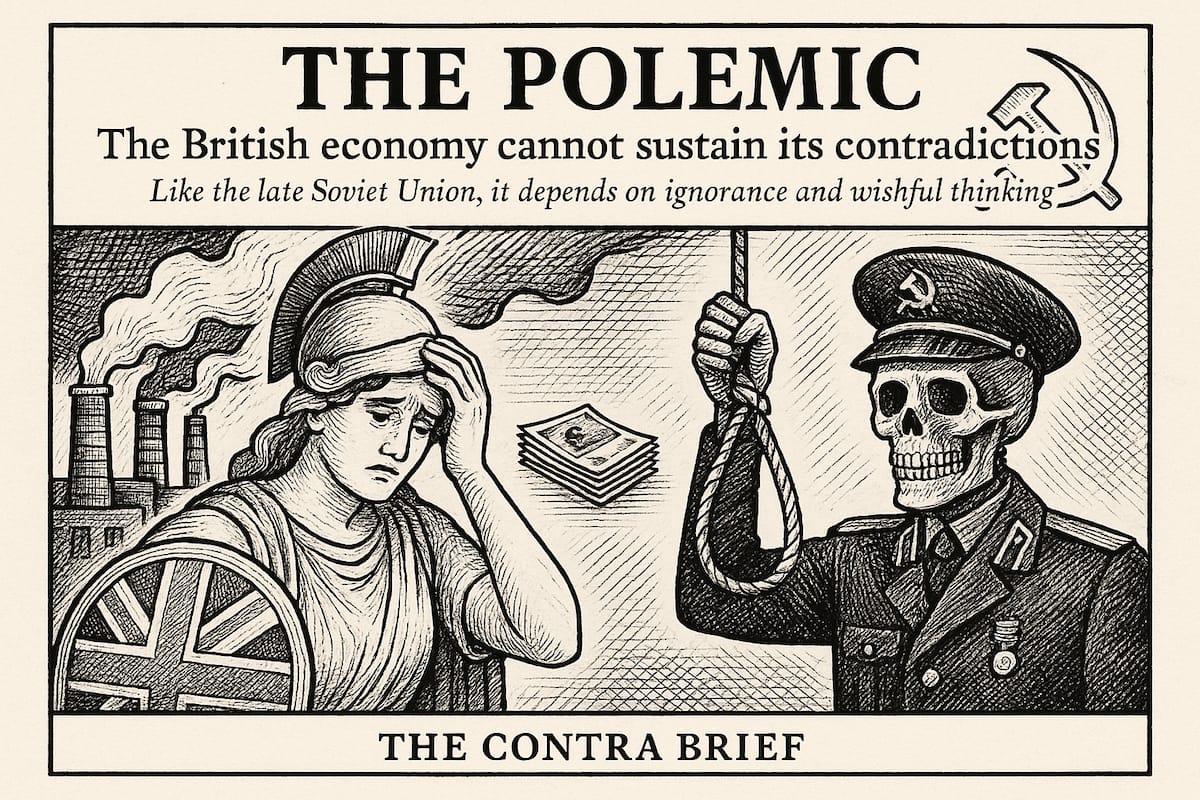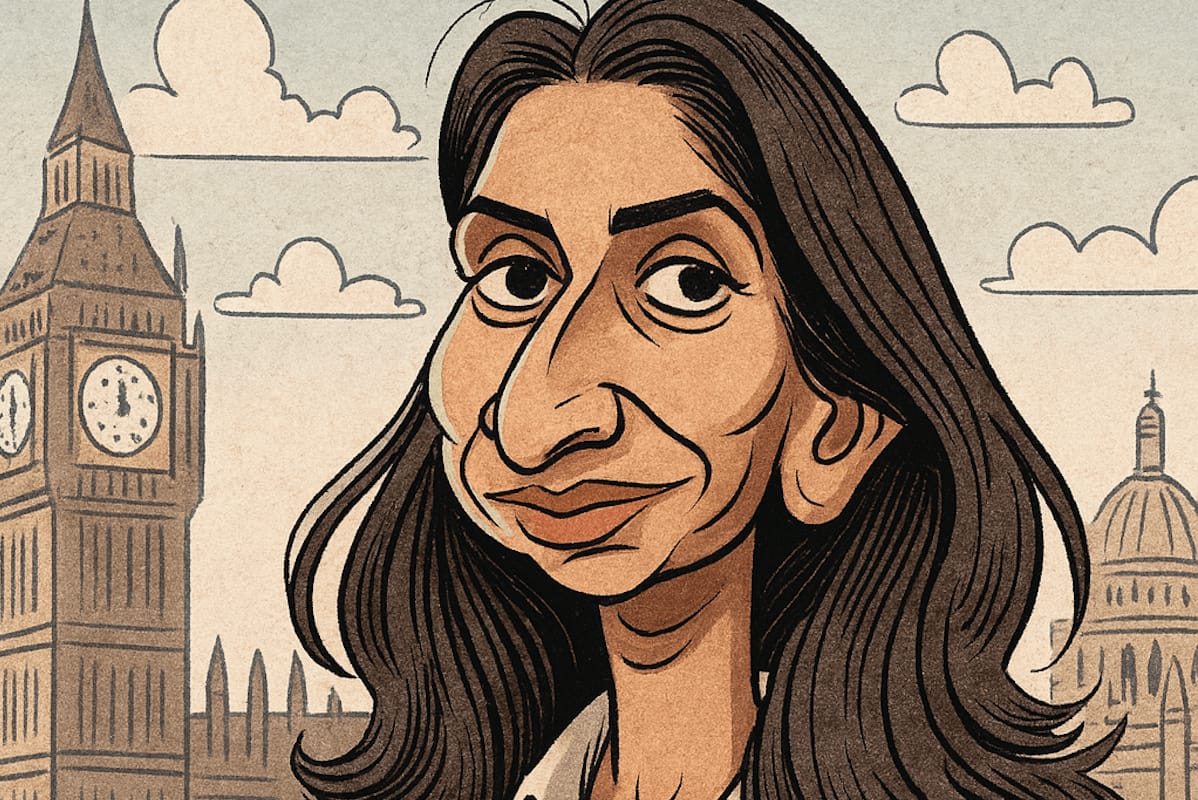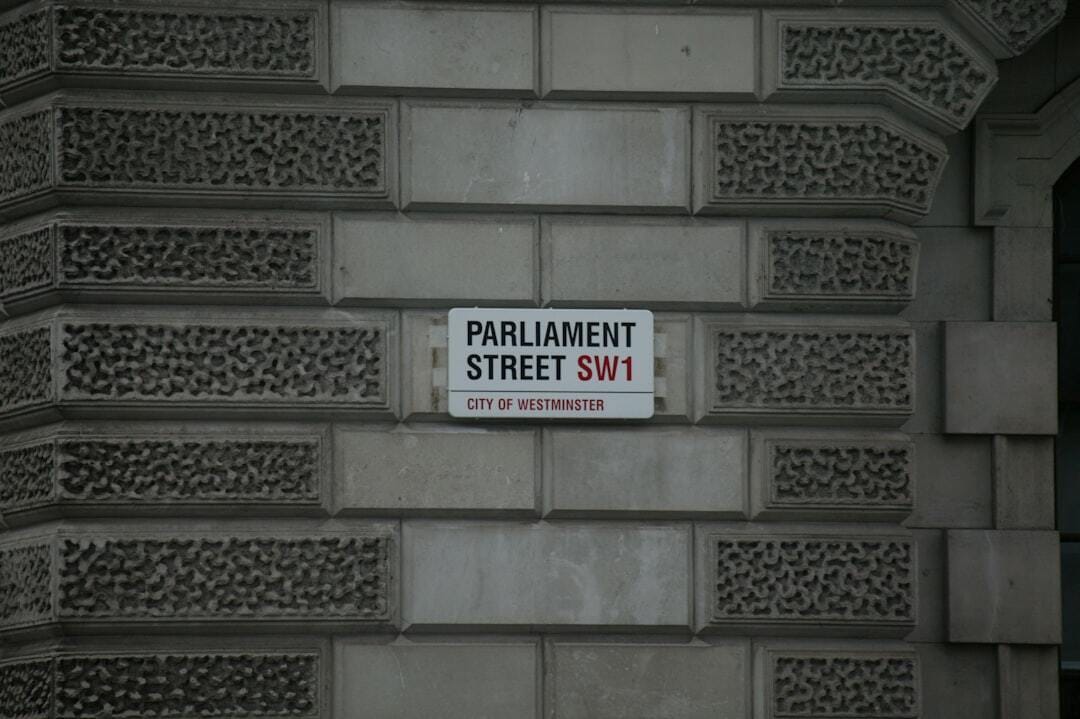The Islamophobia law trap
Britain's doomed economic logic + The broken asylum system for Christians

Editor’s note
Britain is drifting towards blasphemy law by stealth. Not in name, but in function. Under the banner of "Islamophobia," the political class is preparing to elevate religious identity above democratic scrutiny, moral judgement and even the rule of law. This is not tolerance but capitulation.
When criticism of a belief system becomes indistinguishable from racism, public debate dies. When asylum is denied to persecuted Christians while institutions fawn over Islamist sensitivities, moral clarity evaporates. The result is not harmony but hierarchy—one that punishes those who built the country and privileges those who claim offence.
This week's newsletter tracks a deeper rot: the evacuation of equal treatment, the corrosion of British legal neutrality, and the institutionalisation of ideological bias. It’s legal overreach and a moral inversion.
Britain once defended liberty in the name of conscience. Today it prosecutes conscience in the name of cohesion. Contra Brief exists to resist that reversal.
Comment
The Islamophobia law trap

Angela Rayner’s push for an official public-sector definition of Islamophobia is not a political misstep but a cultural rupture. As Patrick West warns in The Spectator, the taboo surrounding this term is mutating into legal doctrine, “moving away from the realm of manners, and into law.” The consequences, both electoral and societal, could be severe.
A poll by JL Partners found that codifying Islamophobia would cost Labour a million votes and gift Reform UK a 106-seat majority. Among the working-class voters Labour once relied on, the proposal lands like a betrayal. “It would be like setting off a tinderbox,” James Johnson, founder of JL Partners, told The Telegraph. That’s no exaggeration. Britain’s political elite appears once again to be criminalising the public’s anxieties rather than addressing them.
The core problem lies in the definition itself. As Melanie Phillips writing in The Times notes, it echoes a 2019 APPG report branding Islamophobia as a “type of racism that targets expressions of Muslimness.” In practice, this collapses criticism of Islam—a religion and ideology—into racial bigotry. It turns scrutiny of specific behaviours, such as grooming gang networks, into prosecutable prejudice. Critics have warned the law would make it impossible for people to raise concerns about crimes tied to religious identity. In that environment, legitimate debate dies—and justice with it.
This isn’t paranoia. It’s precedent. Baroness Casey’s grooming report confirmed that fear of appearing racist allowed mass child abuse to continue unchallenged. That fear was institutional: councils, police, and officials looked away. And the same ideological reflex—don’t offend, don’t generalise, don’t risk it—is now being hardened into statute.
Meanwhile, the panel tasked with drafting the new definition is meeting in secret. Its chair, Dominic Grieve, has already praised a report dismissing discussion of grooming gangs as “anti-Muslim racism”. Such a process has all the hallmarks of a stitch-up: opaque, elitist, and contemptuous of public concern.
Labour’s leadership claims this is about harmony. But the public sees appeasement of lobby groups, of ideological enforcers and of the same multicultural orthodoxy that insists Britain itself is the problem. Phillips puts it plainly: “They are paralysed by their belief that British national identity is inherently racist.” It’s a belief that strips the public of moral legitimacy, reserves compassion for select communities, and weaponises law to enforce silence.
The rule of law must be religion-blind. Speech, even offensive speech, must not be criminalised on the shifting grounds of perception. And citizenship must not be divided by fear of reprisal. Justice which is equal, impartial, and open demands no less.
The attempt to legislate against Islamophobia is not an act of cohesion but of rupture. It will not soothe divisions but will deepen them. Britain doesn’t need another blasphemy law. It needs a political class willing to trust its own people again.
The Polemic
Rights without reason: Britain's doomed economic logic
By Chris Bayliss, via The Critic

Chris Bayliss, writing in The Critic, delivers a sobering analysis of Britain's economic and institutional dysfunction, likening our national condition not to the usual economic basket cases but to something worse: the Soviet Union in its death throes. His warning is simple — Britain is running on borrowed time, and borrowed money, while pretending that legal entitlement and moral sentiment are substitutes for economic logic.
The Soviet system collapsed under the weight of its internal contradictions: it suppressed consumption, distorted prices, concealed failures, and financed decay with commodity exports. Bayliss argues Britain is echoing these dysfunctions not through authoritarian Marxism, but through a bloated liberal jurisprudence that turns every want into a right and every resource allocation into a legal duty. “Prices are ceasing to mean anything,” he writes. “They no longer serve as a signal telling producers where to allocate resources.” That function — the nerve system of any functioning market — has been severed.
Take local authorities. Crippled by statutory obligations such as SEND transport and adult social care, many councils are now trading while insolvent. Yet it would be illegal for them not to provide these services. The result: they march knowingly toward bankruptcy, hoping the Treasury will bail them out when the time comes. Birmingham, ruined by an equal pay ruling that privileged social sentiment over market value, is merely the canary in the coal mine.
These failures are both administrative and systemic. “The wealth is assumed simply to exist because the need exists,” Bayliss notes. The state, hamstrung by equalities law, climate mandates, and human rights jurisprudence, has no command economy to direct supply, no market economy to allocate it efficiently, and no courage to say no. Needs proliferate; producers shrink.
This is not the vulgar overspending of electoral politics. It is something far more intractable — a system where supply must follow demand regardless of cost, consequence, or economic signal. As Bayliss puts it: “We are attempting to create a system in which the economic realm is subservient to that of jurisprudence.”
The fatal flaw is cultural. The Soviets at least retained a grim clarity about hardship. We, by contrast, deny reality behind layers of process, entitlement and euphemism. But reality always settles the bill. And unlike Sergey Akhromeyev, we’re leaving it for someone else.
Flashpoints
YouTube could be forced to promote British public service TV contentOfcom wants YouTube to give BBC and Channel 4 prime placement, potentially by law, to prop up Britain’s faltering public broadcasters as younger viewers abandon linear TV in favour of TikTok and Netflix. | Suella Braverman reveals blueprint for leaving ECHRSuella Braverman has published a detailed legal roadmap for the UK to leave the ECHR, arguing that Strasbourg's "judicial imperialism" undermines national sovereignty and that the time has come not to debate departure, but to execute it. |
Eddie Izzard’s award speaks to the sexism of transSussex University, previously criticised and fined for failing to protect academic freedom during the harassment of gender-critical philosopher Kathleen Stock, has sparked fresh controversy by awarding an honorary doctorate to Eddie Izzard—now known as Suzy. | Two in five phones stolen across Europe taken in BritainBritain, particularly London, accounts for a disproportionately high share of mobile phone thefts in Europe, with thefts surging 425% since 2021 due to factors like festivals, crowded areas, and inadequate policing, making the UK the continent’s top hotspot for stolen devices. |
Comment
The asylum system is broken but only if you’re Christian
A woman fled forced conversion and death threats. Britain told her to go back.
Maria came to the UK seeking refuge from religious persecution. Raised a Christian, she was forced to convert to Islam by colleagues at her workplace in a Muslim-majority country. When she refused to continue complying—insisting on her original faith—she faced threats, an attempted assault and even a kidnapping attempt against her daughter. Upon arrival in Britain, she applied for asylum. The Home Office rejected her.
As solicitor Michael Phillips explained on The Daily Sceptic podcast, Maria’s case was riddled with official indifference and procedural failure. A Muslim Home Office official conducted her initial interview. Her claim was rejected. A first-tier tribunal judge also dismissed her story, despite credible witness evidence, police reports, and expert testimony. Only on a second appeal did a higher tribunal overturn the decision, finally granting asylum but only years after her initial application.
Phillips believes the case is no outlier. It reflects a deeper problem: a structural and cultural bias against Christian claimants from Islamic regimes.
Behind the legal missteps lies something more ideological. Phillips points to organised influence networks inside the Home Office including the Civil Service Muslim Network, whose leaders have been recorded encouraging religiously driven obstruction of policy. He also flags what he calls “a convergence of woke and Islamist sympathies” in public institutions where civil servants are more likely to announce their pronouns than protect religious liberty.
The UK has long understood itself as a sanctuary for the persecuted. But Maria’s experience suggests a reversal: Christian asylum seekers from Muslim countries face suspicion, while Islam is often treated with institutional reverence. Hate crimes against mosques are treated as such by default. Churches? Not so much. As Phillips noted, Christian clergy report police interest only when victimisation fits a politically convenient narrative.
Maria’s words capture the tragedy best: “I came to the UK and felt finally safe in a Christian country.” She was wrong.
This is more than a bureaucratic failure. It’s the logical endpoint of an elite worldview that sees Christianity as oppressive, Islam as oppressed, and the nation’s foundational values as negotiable. A country that no longer defends its moral inheritance cannot expect to remain a haven for those fleeing tyranny. If the Home Office cannot distinguish between a persecutor and their victim, then reforming asylum policy is not just urgent—it’s a civilisational imperative.
Worth watching
Professor David Betz, a war studies expert at King's College London, argues that the West, particularly Britain, is entering a phase of deep instability that mirrors many of the textbook conditions for civil war or insurgency. Drawing from decades of research on internal conflicts abroad, Betz warns that the same drivers: loss of political legitimacy, polarised factionalism and ethnic status anxiety are now visible in the UK.
Quote of the week
We are working to close hotels, restore order, and put fairness and value for money at the heart of our asylum system.
Until next time,





